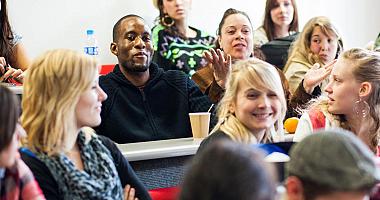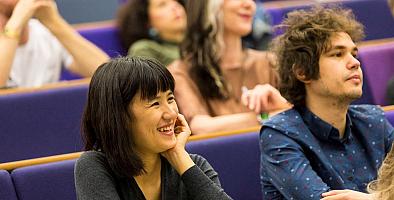MA Applied Anthropology & Community & Youth Work
Content navigation menu
Why study MA Applied Anthropology & Community & Youth Work at Goldsmiths
Professionally validated by the National Youth Agency and the Endorsement and Quality Standards Board for Community Development, this MA brings together youth work and community development theory and practice with the research methods and theoretical preoccupations of anthropology.
-
This MA is the first of its kind in the country, combining academic and practice learning with high-level professional qualifications. It is aimed at students who wish to pursue a career in youth and community work and associated sectors, and those who want an MA with additional professional qualifications to enable more senior career progression.
-
Taught by academics across Anthropology and Social, Individual and Community Wellbeing, the programme reflects the common concerns of lecturers in both disciplines, with a particular focus on social justice, youth work and community development.
-
Established in 1992, it is the first of three fieldwork pathway options, with an additional pathway in Community Development launched in 2012 and a Community Arts pathway launched in 2015. Community Development and Community Arts are merged at the point of pathway entry but allow for fieldwork specialism in each distinct area. Explore the MA Applied Anthropology and Community Development/Community Arts page for details on this entry point.
-
Fieldwork pathways each have a different placement focus (youth and community work; community development; community arts) but all pathways are taught together, providing many opportunities for the exchange of ideas and collaboration between students as well as interaction with an extensive range of organisations and practitioners.
-
We have been rated top 10 in the UK for anthropology in the QS World University Rankings by Subject 2025.
Contact
If you have specific questions about the degree, contact Martin Webb (Anthropology co-convenor) or Louise Doherty (STaCS co-convenor).
Length
1 year full-time or 2 years part-time
Fees
Home - full-time: £11800
Home - part-time: £5900
International - full-time: £22000
School
Subjects
Anthropology
Social, Individual and Community Wellbeing

This programme is fully endorsed by the National Youth Agency for pay and qualification purposes and endorsed by the Endorsement and Quality Standards Board for Community Development.
What you'll study
The MA combines an academic programme of lectures, seminars and tutorial assignments with placement-based practical experience.
Modules are taken over one academic year if you are studying full-time, or two years if you are studying part-time (part-time study is only available to home students).
Full-time students attend STaCS on Tuesdays and Anthropology on Thursdays and spend the rest of the week on fieldwork placements and library studies.
Part-time students attend on Thursdays in the first year and Tuesdays in the second year. Placements take place in year two when you join the STaCS half of the programme.
Structure
The structure of the programme provides the reliability that many of our students who have work and caring responsibilities beyond university require to take the step into postgraduate education, while providing clearly signposted opportunities to personalise their learning journey.
Put simply, I honestly believe I would not have got any of my three jobs since completing the course in 2003 without the MA. This is mostly reputation. The course has a cachet amongst managers in the voluntary sector, and the assumption is that students are able not only to do development work but also do it in the right way, with values and processes embedded.
Former student
Careers
Increasing employment prospects are central to this programme.
Our graduates find work directly or indirectly related to the disciplines relatively quickly after graduating, or even while on the programme. The majority of our students gain work in youth work or community work. Examples of recent graduate employment include:
- Full-time health youth worker for a London Borough, leading on LGBTQ awareness and homophobic bullying
- CEO of a charity supporting young people with SEND
- Community centre-based senior youth worker
- Mentoring and Befriending Co-ordinator at a civil society equalities organisation
- Community Development Worker in a social work team in Hong Kong
Some gain work in a wide range of other settings, often shaped by the particular interests that they develop during their time with us, such as working with refugees or with specific or marginalised groups. Others join social enterprises to bid for contracts, join newly developing cooperatives or established NGOs in the UK and abroad.
We also have many alumni who have gone on to teach at university themselves.
Placements
Placement experiences and networks developed while on the programme often produce new job opportunities. As one recent graduate explained:
“I actually managed to find paid employment as a result of making a good impression during my second placement. My third placement was a job that I was able to progress effectively in and was a real step up in terms of experience and responsibility. I eventually became a line manager there, and was working on a payment by results programme, which really reflected the new political climate. It also made for a very interesting and topical research essay that I scored really well on. I know that employers look upon my CV and applications favourably due to the fact that I have an MA in community and youth work from Goldsmiths.”
Studying the MA provided me with an opportunity to validate 20 years of practice. Before completing the MA I was promoted to a management post (the obvious impact of the course on my work was specifically highlighted during post-interview feedback). It is clear to me that the course delivered positive outcomes in terms of career progression.
Former student, now a senior lecturer
Entry requirements
You should normally have the following qualifications and experience:
- An undergraduate degree of at least second class standard in the social sciences or another appropriate subject, with some experience of community and youth work.
- One year of full-time, or part-time equivalent, work experience prior to starting the MA. Experience can include paid or unpaid work; voluntary, community and youth work in organisations; and relevant informal work.
- An Enhanced Disclosure Certificate from the DBS. Please note there will be a fee of £56 for all DBS applications; we will send you further information about payment with your offer. Find out more about our fitness to train requirements.
You might also be considered for some programmes if you aren’t a graduate or your degree is in an unrelated field, but have relevant experience and can show that you have the ability to work at postgraduate level.
International qualifications
We accept a wide range of international qualifications. Find out more about the qualifications we accept from around the world.
If English isn’t your first language, you will need an IELTS score (or equivalent English language qualification) of 6.5 with a 6.5 in writing and no element lower than 6.0 to study this programme. If you need assistance with your English language, we offer a range of courses that can help prepare you for postgraduate study.
Fees and funding
Annual tuition fees
These are the PG fees for students starting their programme in the 2025/2026 academic year.
- Home - full-time: £11800
- Home - part-time: £5900
- International - full-time: £22000
If your fees are not listed here, please check our postgraduate fees guidance or contact the Fees Office, who can also advise you about how to pay your fees.
It’s not currently possible for international students to study part-time under a student visa. If you think you might be eligible to study part-time while being on another visa type, please contact our Admissions Team for more information.
If you are looking to pay your fees please see our guide to making a payment.
Funding opportunities
In recent years students on the programme have been supported by awards from the Chevening Scholarship, the Jean Monnet Scholarship, and the Aziz Foundation.
Explore the Goldsmiths scholarships finder to find out what other funding you may be eligible for.
If you are a UK student you may be eligible for a postgraduate loan.
Meanwhile our Careers Service can also offer advice on finding work during your studies.
Paying your fees
Find out about paying your tuition fees.
Additional costs
In addition to your tuition fees, you'll be responsible for any additional costs associated with your course, such as buying stationery and paying for photocopying. You can find out more about what you need to budget for on our study costs page.
There may also be specific additional costs associated with your programme. This can include things like paying for field trips or specialist materials for your assignments. Please check the programme specification for more information.
How to apply
You apply directly to Goldsmiths using our online application system.
To complete your application, you will need to have:
- Details of your academic qualifications
- The email address of your referee who we can request a reference from, or alternatively a copy of your academic reference
- Copies of your educational transcripts or certificates
- A personal statement
- A work experience report. This work experience report should be up to 1,000 words about your recent personal experience of working or volunteering in a community and/or youth work setting. It should outline this recent work experience, consisting of a brief description of the agency or project, your role within the agency, the responsibilities carried out and actual work done. You should outline the reflections on learning gained from the work experience
You'll be able to save your progress at any point and return to your application by logging in using your username/email and password.
When to apply
We accept applications from October for students wanting to start the following September.
We encourage you to complete your application as early as possible, even if you haven't finished your current programme of study. It's very common to be offered a place that is conditional on you achieving a particular qualification.
Late applications will only be considered if there are spaces available.
If you're applying for funding, you may be subject to an earlier application deadline.
Selection process
Admission to many programmes is by interview, unless you live outside the UK. Occasionally, we'll make candidates an offer of a place on the basis of their application and qualifications alone.
DBS checks
If we make you an offer to study on this programme, we will ask you to complete an application for an Enhanced Disclosure Certificate from the DBS. Please note there will be a fee of £56 for all DBS applications; we will send you further information about payment with your offer. Find out more about our fitness to train requirements.
Further guidance
Read our guide to applying for a postgraduate degree at Goldsmiths.





